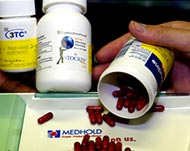Experts defend ‘virulent HIV’ warning
Aids experts who created an uproar when they publicised the case of a man infected with an apparently uniquely dangerous mutant of HIV, have said it was important to warn health officials.

The case is important because the patient has a form of the virus that is both resistant to several classes of drugs and because it seems to be unusually virulent, Dr David Ho of the Aaron Diamond Aids Research Centre in New York and colleagues reported on Thursday.
To make matters worse, the patient was a methamphetamine user who said he had unprotected sex with at least 10 partners before he knew he was infected, which means this difficult-to-treat version of the virus could have been spread.
“This infection has resulted in progression to symptomatic Aids … over a course of four to, at most, 20 months,” Ho told a special evening session of the 12th Conference on Retroviruses and Opportunistic Infections being held in Boston.
Sideshow?
Some activists and HIV specialists criticised Ho and the New York Department of Health for publicising the case, saying it was a sideshow when 40,000 people become infected with the incurable virus in the United States alone every year.
 |
|
Using drug cocktails could lead to |
They said ordinary HIV is bad enough, destroying the immune system with no hope for a cure of vaccine in sight. More than 39 million people globally are infected and more than 28 million have died.
And they worried about a backlash against gay men.
The patient’s virus is not stopped by drugs in three of the four licensed classes of HIV antiretrovirals, Ho said.
This is not unusual in and of itself, researchers told the conference. But on top of this, the virus gets into the immune cells it targets using two separate molecular doorways called receptors.
“Early in infection that is unusual,” agreed Dr Ron Valdiserri, a top Aids expert at the US Centre for Disease Control and Prevention.
Drug-resistant strains
Valdiserri and other experts expect that as more people take drug cocktails to control HIV, more drug-resistant strains of virus will turn up. That is because if patients do not take drugs precisely on time without missing a dose, the virus will eventually mutate to resist drugs.
|
“More than two decades into the HIV/Aids epidemic, why are some persons still placing themselves at high risk for infection?” Dr Harold Jaffe, Oxford University |
So the experts gathered to try to determine just how unusual and scary this case really is.
Stephen Gange and Alvaro Munoz of Johns Hopkins University in Baltimore studied more than 10,000 men and women at risk of HIV between 1984 and 2003 and found it took anywhere between 6 months and 20 years for patients to develop symptoms after being infected.
While rapid progression to full blown Aids is rare, it is not new, they told the meeting.
Mutated strains
Ho’s team said its members were worried because mutated HIV strains usually are weak and this man’s strain is not.
But Andrew Leigh Brown of Britain‘s University of Edinburgh reviewed several studies that had detailed transmission of drug-resistant HIV from person to person.
Most drug resistant strains never get transmitted, he said.
Those that do get passed along are strong.
Dr Harold Jaffe of Britain‘s Oxford University said the case highlighted a big problem. “More than two decades into the HIV/Aids epidemic, why are some persons still placing themselves at high risk for infection?” he asked.
People have lost their fear of the virus; some groups are hard to reach with health education messages, and people incorrectly believe patients taking HIV cocktails cannot spread the virus, he said.